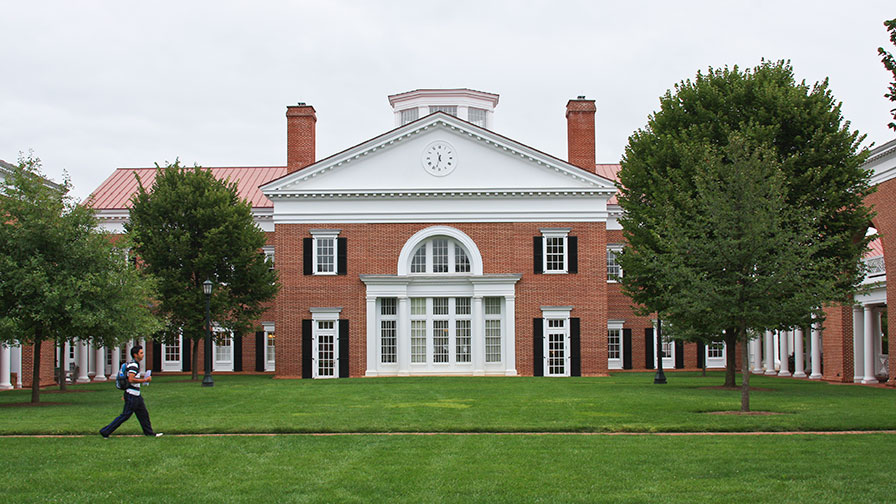
German Scientist and Green Party Parliamentarian Discusses Energy Transition at the UVA Darden School of Business
By Allison Elias
“If you want a revolution, you can’t do it in your country alone,” said Hermann Ott, scientist and member of the German Federal Parliament (Bundestag) for the Green Party. His country launched an energy revolution to transform the way Germans power their lives, and he shared how they did it Tuesday, 30 April, at the University of Virginia Darden School of Business.
Ott discussed Germany’s transition to renewable energy. The Darden Institute for Business in Society, UVA’s interdisciplinary Center for German Studies, and the Boell Foundation, an environmental and political nonprofit headquartered in Berlin, hosted his visit. Darden Professor Peter Debaere, an international economist, and Rebecca Bertram, program director of environment and global dialogue at the Boell Foundation’s Washington, D.C., office, began the event by introducing Ott to a full classroom of faculty, students, staff and community members.
Ott outlined the Energiewende, the German name for government policies that aim to establish a renewable energy economy, phase out nuclear power and eliminate the use of fossil fuels. He acknowledged that many have been skeptical of the Renewable Energy Act, instituted in 2000, with good reason: Germany’s natural environment does not have many solar, wind or hydropower sources; however, its industrial economy is well-developed. Yet, German citizens and political parties believe that environmental concerns should inform broader German policy.
According to Ott, Germany demonstrates how a country with a heavy industrial base can concurrently fight climate change, stabilize energy sources, decrease energy costs and phase out nuclear energy. Germany increased its percentage of total electricity in renewable form from 7 percent in 2000 to 22 percent in 2012. This transition is in large part due to the feed-in tariff that guarantees that producers of electricity from renewable sources are paid a high fixed rate when they feed their excess electricity back into the grid. Furthermore, conventional means of harnessing energy produces environmental costs that negatively affect future generations. Initially, renewables involve installation costs. However, subsequent renewables involve almost no accrued costs. By transitioning to renewables, Germany’s energy security will increase as reliance on imports decline.
Ott also argued that citizens, communities and small businesses have propelled the shift toward clean energy in large part because they believe renewable energy benefits Germany’s economy. While large corporations have been slower to move, individuals and small businesses account for more than half of the investments made in renewables.
“The renewable energy transition has helped those struggling to find jobs,” said Ott. The number of people employed in Germany’s renewable energy industry has risen from 60,000 in 1998 to 375,000 in 2011. The Green Party is learning that connecting with working people and their trade unions, which reinforces the economic benefit of the transition, better enables the switch to renewables to succeed.
“It was stimulating to have Hermann Ott here. It reminds us that societies face the challenge of climate change in different ways. What struck me was the optimism and eagerness of Ott, and the German Greens generally, to expand and experiment with renewables,” said Debaere. “At the same time, and this is a strong contrast with the United States, one cannot help but be impressed by the deep consensus across all strata of society, conservatives and progressives, that environmental concerns should inform Germany’s policies.”
Ultimately, Ott believes that large-scale change in market structure is necessary to achieve the energy transition. Currently, social norms that tolerate waste and value materialism lead markets to deplete fossil fuels. He hopes that shifting standards toward simplicity and efficiency will encourage new economic and environmental models such as Germany’s renewable energy policies.
Listen to Ott discuss his views and how partnerships can play a role in energy transition efforts in the Darden BusinessCast.
The University of Virginia Darden School of Business prepares responsible global leaders through unparalleled transformational learning experiences. Darden’s graduate degree programs (MBA, MSBA and Ph.D.) and Executive Education & Lifelong Learning programs offered by the Darden School Foundation set the stage for a lifetime of career advancement and impact. Darden’s top-ranked faculty, renowned for teaching excellence, inspires and shapes modern business leadership worldwide through research, thought leadership and business publishing. Darden has Grounds in Charlottesville, Virginia, and the Washington, D.C., area and a global community that includes 18,000 alumni in 90 countries. Darden was established in 1955 at the University of Virginia, a top public university founded by Thomas Jefferson in 1819 in Charlottesville, Virginia.
Press Contact
Molly Mitchell
Associate Director of Content Marketing and Social Media
Darden School of Business
University of Virginia
MitchellM@darden.virginia.edu





